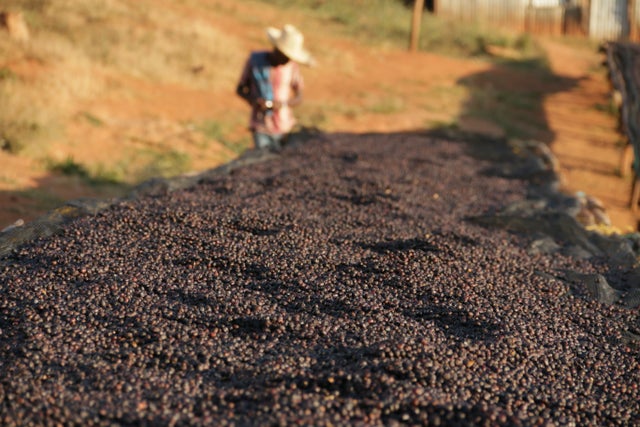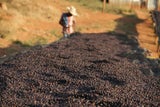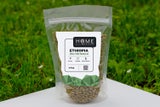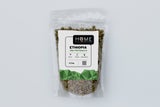- Green Coffee
- >
- Ethiopia
- >
- Ethiopia - Oba Toli Natural
Ethiopia - Oba Toli Natural
Origin: Ethiopia
Region: Gera, Jimma
Cooperative: Oba Toli
Drying Station: Oba Toli
Cultivars: Metu Bishari Selection
Altitude: 1970 masl
Process: Natural
Screen: 14+
Moisture: 11.5 %
Density: 0.698 g/ml
Cupping Score: 86.4
Cupping Notes: Raspberry, vanilla, whiskey, raisins
TRACEABILITY
Oba Toli is a small cooperative compared to other excellent cooperatives in the Jimma region. It has a total of 120 members, of which 81 are men and 39 are women. This dry processed lot impressed us at the cupping table with its sweetness and cleanness, as well as its intense raspberry, vanilla and raisins notes. For the first time in Ethiopia, we have selected a Grade 4 lot, but we requested to be dry milled as Grade 2, so it is an excellent opportunity for those roasters who want to enjoy the classic Ethiopian natural cup profile, with a price-quality ratio that the Grade 1s this season cannot provide and without too many physical defects.
The natural process is respectful with the environment because it does not require water and develops extremely sweet and fruity flavours with a heavy body, when it is produced with care, experience and attention. The drying station at Oba Toli works separately from the washing station. The process is carried out in an area full of African beds. These beds are built mostly of bamboo poles at waist height, and are covered with a material such as a nylon net to allow the air to flow between the cherries and dry them evenly. The farmers arrange the cherries in very thin layers and rotate them constantly for several days. At night, or in case of rain, the coffee is covered with huge sheets of plastic. When the cherries are dry and the process is complete, these are taken to a dry mill for hulling and grading in Addis Ababa.
MOST FEATURED PRODUCTS
Kenya Nyeri AB
coffOrigin: Kenya
County: Nyeri
Cooperative: New Gikaru FCS
Washing Station: Various
Farmers: 3800 active members (1444 female, 2356 male)
Cultivar: SL28 - SL34 - Ruiru 11 (Grafted with SL 28)
Altitude: 1633 masl
Process: Fully washed with double fermentation
Screen: 15-16
Moisture: 10.6%
Density:0.772 g/ml
Cupping Score: 86.5
Cupping Notes: Orange, cinnamon, apricot, balanced
Rwanda - Macuba
Origin: Rwanda
County: Nyamasheke
Washing Station: Macuba
Farmers: 465 active members (186 female, 279 male)
Cultivar: 100% Red Bourbon
Altitude: 1685 masl
Process: Fully washed
Screen : 15+
Moisture : 10.5%
Density : 0.71 g/ml
Cupping Score: 85.7
Cupping Notes: Apricot, Caramel, Brown Sugar, Orange





